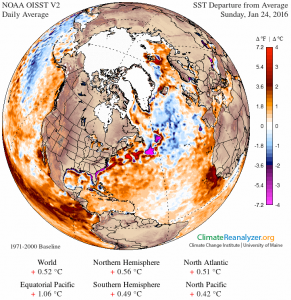Ross McKitrick was so upset about a paper ‘Learning from mistakes in climate research’(Benestad et al., 2015) that he has written a letter of complaint and asked for immediate retraction of the pages discussing his work.
This is an unusual step in science, as most disagreements and debate involve a comment or a response to the original article. The exchange of views, then, provides perspectives from different angles and may enhance the understanding of the problem. This is part of a learning process.
Responding to McKitrick’s letter, however, is a new opportunity to explain some basic statistics, and it’s excellent to have some real and clear-cut examples for this purpose.
[Read more…] about Anti-scientists
References
- R.E. Benestad, D. Nuccitelli, S. Lewandowsky, K. Hayhoe, H.O. Hygen, R. van Dorland, and J. Cook, "Learning from mistakes in climate research", Theoretical and Applied Climatology, vol. 126, pp. 699-703, 2015. http://dx.doi.org/10.1007/s00704-015-1597-5
